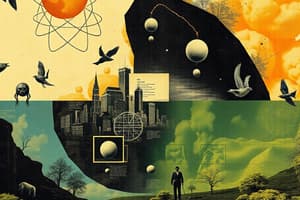Podcast
Questions and Answers
What is the focus of botany?
What is the focus of botany?
- Study of microorganisms
- Study of plants (correct)
- Study of genetic variations
- Study of animal behavior
Which concept explains how populations change over generations?
Which concept explains how populations change over generations?
- Evolution (correct)
- Homeostasis
- Energy Flow
- Cell Theory
What is the basic unit of structure and function in living organisms?
What is the basic unit of structure and function in living organisms?
- Ecosystem
- Organ
- Cell (correct)
- Molecule
Which branch of biology focuses on the study of microorganisms?
Which branch of biology focuses on the study of microorganisms?
What process maintains a stable internal environment in organisms?
What process maintains a stable internal environment in organisms?
What term refers to the transfer of energy through an ecosystem?
What term refers to the transfer of energy through an ecosystem?
Which study focuses on the function of organs and organ systems?
Which study focuses on the function of organs and organ systems?
What is the molecule that carries the genetic instructions in an organism?
What is the molecule that carries the genetic instructions in an organism?
What is the first step in the scientific method?
What is the first step in the scientific method?
Which biological molecule is primarily responsible for energy storage?
Which biological molecule is primarily responsible for energy storage?
What is the primary function of photosynthesis?
What is the primary function of photosynthesis?
Which level of biological organization comes after tissues?
Which level of biological organization comes after tissues?
In which domain would you classify a unicellular organism with no nucleus?
In which domain would you classify a unicellular organism with no nucleus?
What is the main purpose of metabolism in organisms?
What is the main purpose of metabolism in organisms?
Which type of reproduction involves the merging of genetic material from two parents?
Which type of reproduction involves the merging of genetic material from two parents?
Why is biology important in addressing global challenges?
Why is biology important in addressing global challenges?
Flashcards
What is Biology?
What is Biology?
The study of living organisms, including their structure, function, growth, origin, evolution, and distribution.
Cell Theory
Cell Theory
All living organisms are composed of cells, which are the basic units of structure and function in living things. All cells come from pre-existing cells.
What is Evolution?
What is Evolution?
The process by which populations of organisms change over generations through genetic variation. This explains the diversity of life on Earth.
Homeostasis
Homeostasis
Signup and view all the flashcards
Energy Flow
Energy Flow
Signup and view all the flashcards
What is DNA?
What is DNA?
Signup and view all the flashcards
What is Botany?
What is Botany?
Signup and view all the flashcards
What is Zoology?
What is Zoology?
Signup and view all the flashcards
Hypothesis
Hypothesis
Signup and view all the flashcards
Prediction
Prediction
Signup and view all the flashcards
Experiment
Experiment
Signup and view all the flashcards
Data Analysis
Data Analysis
Signup and view all the flashcards
Conclusion
Conclusion
Signup and view all the flashcards
Carbohydrates
Carbohydrates
Signup and view all the flashcards
Lipids
Lipids
Signup and view all the flashcards
Proteins
Proteins
Signup and view all the flashcards
Study Notes
Introduction to Biology
- Biology is the natural science studying life and living organisms—structure, function, growth, origin, evolution, and distribution.
- Biology encompasses topics from the smallest molecules within cells to the largest ecosystems on Earth.
- Biology uses the scientific method to investigate biological phenomena.
Key Branches of Biology
- Botany: Study of plants—structure, function, growth, reproduction, and evolution.
- Zoology: Study of animals—diversity, behavior, physiology, and evolution.
- Microbiology: Study of microorganisms (bacteria, viruses, fungi, protists)—structure, function, interactions.
- Genetics: Study of heredity and inherited characteristics' variation.
- Ecology: Study of interactions between organisms and their environment—population dynamics, communities, ecosystems.
- Cell Biology: Study of cells—structure, function, and behavior (basic units of life).
- Molecular Biology: Study of biological molecules (proteins, DNA) and their roles in biological processes.
- Physiology: Study of organ and organ system functions in organisms.
Fundamental Concepts in Biology
- Cell Theory: All living things are composed of cells; cells are the basic units of structure and function; all cells come from pre-existing cells.
- Evolution: Populations change over generations due to genetic variation; a core concept explaining life's diversity on Earth; natural selection is a key mechanism.
- Homeostasis: Maintaining a stable internal environment; allows organisms to survive in varying external conditions.
- Energy Flow: Transfer of energy within an ecosystem, from producers to consumers to decomposers; describes energy movement through trophic levels.
- DNA: Molecule carrying genetic instructions for building and maintaining organisms; essential for cell division and inheritance; DNA replication.
The Scientific Method
- Observation: Noticing a natural phenomenon.
- Question: Formulating a question about the observed phenomenon.
- Hypothesis: A testable explanation for the question.
- Prediction: Specific prediction based on the hypothesis.
- Experiment: Designing and conducting an experiment to test the prediction.
- Data Analysis: Collecting and analyzing experiment data.
- Conclusion: Drawing conclusions from data analysis, confirming or rejecting hypothesis.
Biological Molecules
- Carbohydrates: Essential for energy storage and structural support, e.g., glucose.
- Lipids: Provide energy storage, insulation, and form cell membranes, e.g., fats and oils.
- Proteins: Carry out diverse cellular functions (catalysis, transport, support), e.g., enzymes.
- Nucleic Acids: Carry genetic information (DNA and RNA).
Basic Biological Processes
- Photosynthesis: Conversion of light energy by plants into chemical energy (glucose).
- Cellular Respiration: Breakdown of glucose by cells to release energy in the form of ATP (adenosine triphosphate).
- Reproduction: Creation of new organisms (sexual and asexual).
- Metabolism: All biochemical reactions within an organism (growth, maintenance, repair).
Diversity of Life
- Classification of organisms into domains (Bacteria, Archaea, Eukarya).
- Hierarchical classification (kingdom, phylum, class, order, family, genus, species).
Levels of Biological Organization
- Organization from atoms to molecules, cells, tissues, organs, organ systems, organisms, populations, communities, ecosystems, biosphere.
- Increasing complexity and interconnections at each level.
Importance of Biology
- Fundamental to understanding the natural world.
- Crucial for medicine, agriculture, and biotechnology innovations.
- Essential for addressing global challenges (food security, environmental issues, disease control).
Studying That Suits You
Use AI to generate personalized quizzes and flashcards to suit your learning preferences.




